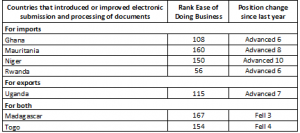Last week, in the post Reforms that make doing business easier, we discussed the Ease of Doing Business rankings. These appear in the World Bank’s Doing Business Report. We focused on a few sub-Saharan Africa (SSA) countries, and what they did recently to improve their ranks. There are many important that the World Bank takes into account when building this index. Today we want to focus on the trading across borders indicator – particularly important for doing international business!
This indicator relates to various aspects of the logistics related to international trade. Improvement in these areas may lead to trade growth, export diversification and economic growth.
Among trade reformers, many SSA countries made trading across borders easier by improving their existing electronic systems for both imports and exports. This has reduced the cost and time of documentary and border compliance.

Ghana, Madagascar, Mauritania, Niger, Rwanda and Togo introduced or improved electronic submission and processing of documents for imports. Out of these, the best ranked in the overall index is Rwanda (56). Further, Ghana and Niger improved 6 and 10 positions respectively this last year. Actually, there is a great deal of simple actions a government can take that may have an important impact on these rankings. For example, Rwanda, Ghana and Niger removed the pre-arrival assessment inspection for imports which reduced import documentary compliance time.

For instance, Madagascar, Togo and Uganda introduced or improved electronic submission and processing of documents for exports between 2015 and 2016. Particularly, Madagascar and Togo have a lot of room to improve given their poor performance, 167th and 154th respectively out of 190 countries, in the 2017 report. However, if more measures that help simplify logistics in the trade sector are implemented, along with other socially-oriented policies, these countries may experience a remarkable improvement in a wider range of indicators.
It is obvious that there are a lot of factors that play a role in the overall performance of a specific country. The good news is that SSA countries have a great opportunity to leapfrog in technology and rapidly adapt trade to a better electronic framework. This will result in productivity and economic growth gains that hopefully, will contribute improving living conditions for all.
Any experiences trading with these countries?
Nadim Elayan, Research Assistant at IESE Business School, collaborated in this article.
___________________________________________________________________________
RELATED POSTS:


Thanks Nadim and Africa for this conversation. I do not know much about other SSA countries when it comes to ‘doing trade across borders’. Based on my experience of the East African region, I agree that Rwanda is way ahead! Interestingly, other countries in the region such as Tanzania are actually now learning from Rwanda how to do it better! My question is: how such a small country like Rwanda is doing so well in this area when the investment in technology per capital isn’t as much higher as in countries like Kenya? Is it to do with ‘how seriously’ a country sees opportunity and growth -specific advantages by investing in technology (e.g. electronic framework) to ease trade within and across its borders?
Salaam, Aloys
Should Rwanda always be cited as an example knowing that it is a dictatorial and predatory state?
The long-running question I ask myself is whether dictatorships, or at least the “authoritarian” regimes, are the only alternatives for the development of Africa.
Many of my African friends are convinced that the “culture of the leader” is deeply anchored in their genes.
Perhaps, dear Africa, should we have the guts to approach this delicate problem head on. Then maybe could we approach our collaboration with the African Continent in a different way.
I take this opportunity to wish you a merry Christmas, an excellent year 2017 and especially a good continuation in your great mission.